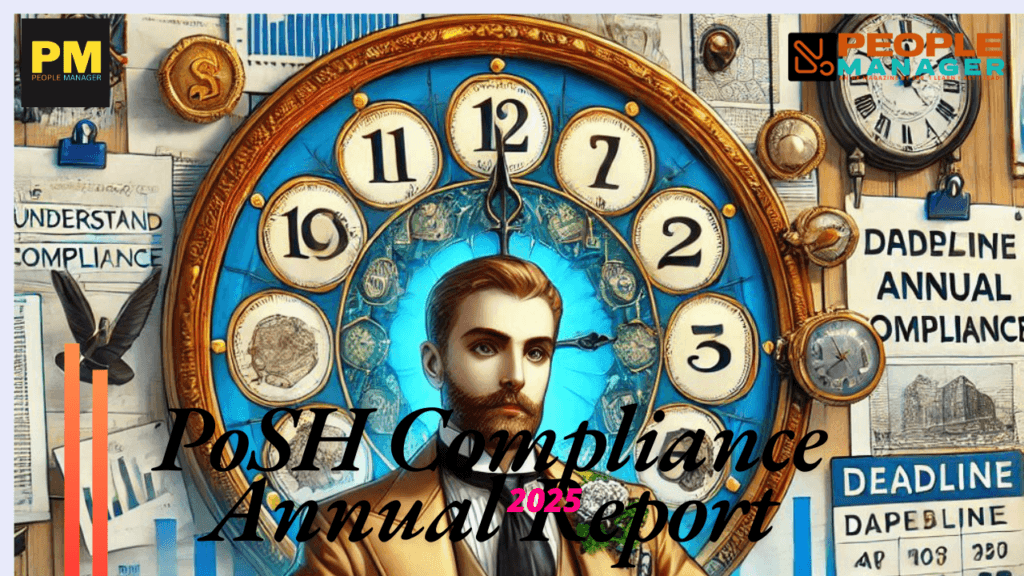POSH Compliance Annual Report : Deadline Approached
The organization has to focus on the critical aspects of the Sexual Harassment of Women at Workplace (Prevention, Prohibition and Redressal) Act, 2013, commonly known as the POSH Act.

As of the beginning of the year 2025, every business is required to comply with and ensure that they are in conformity with all applicable regulations. This is because we have just entered the year 2025. So that they can ensure safe and improved work environment for the workforce year ahead. There are make laws which need to complay, but the Organization has to focus on the critical aspects of the Sexual Harassment of Women at Workplace (Prevention, Prohibition and Redressal) Act, 2013, commonly known as the POSH Act,. This law mandates that organizations with more than 10 employees must adhere to specific guidelines to ensure a safe and respectful working environment. The discussion covers essential steps for compliance, the annual report filing process, and how to handle complaints effectively.
Minimum Compliance Requirements for POSH
The POSH Act requires organizations to follow five key steps to ensure compliance:
- POSH Policy: Every organization must have a clear and comprehensive POSH policy. This policy should state that sexual harassment is strictly prohibited with zero tolerance, outline the consequences of violations, detail the redressal procedure, and ensure confidentiality. The policy should align with the POSH Act but can be customized to meet organizational needs, such as incorporating a gender-neutral approach or including bystander intervention protocols. The policy should also be easily understood and accessible to all employees.
- Internal Committee (IC) Constitution: Organizations must constitute an IC to handle complaints of sexual harassment.
- The IC must include a senior woman employee as the Presiding Officer. This person can be from any department, but must be an employee of the organization. The employer or director cannot be the Presiding Officer.
- An external member, who is experienced in women’s issues, is mandatory.
- At least two other employees from different departments must be included.
- The IC must have at least 50% female members.
- The constitution of the IC must be formalized through a written order, such as a board resolution for companies.
- Awareness Building: Organizations must conduct awareness programs for employees. This can be done through training sessions, posters, e-learning modules, or webinars. The contact details of the IC should be communicated to all employees so they can reach out with concerns or queries. Awareness posters should be displayed in conspicuous locations.
- IC Capacity Building: It is crucial to build the capacity of the IC members. This involves providing training and workshops to ensure they have the knowledge and skills to conduct inquiries in accordance with the law. IC members should understand how to use their powers, which are similar to those of a civil court, especially in summoning evidence, calling witnesses, and recommending punishments.
- Annual Report: Organizations are required to file an annual report with the District Officer. This report must detail the number of sexual harassment complaints received and addressed during the calendar year. This report is typically filed between January 1st and January 31st of the following year.
Handling POSH Complaints
If a complaint of sexual harassment is filed, organizations must follow specific procedures:
- Complaint Filing: Complaints should be filed within three months from the last incident of sexual harassment. The IC has the authority to extend this period by another three months, provided there is a valid reason.
- Response to the Complaint: Within seven days of receiving a complaint, a copy must be given to the respondent. The respondent has ten working days to respond to the IC. The process must adhere to the principles of natural justice, allowing both parties a fair chance to present their case.
- Conciliation or Inquiry: The IC may offer conciliation if both parties agree. If conciliation is not chosen or is not successful, the IC will proceed with an inquiry.
- Inquiry Timeline: The inquiry must be completed within 90 days from the receipt of the complaint, which includes the time given to the respondent to reply. After the inquiry, the IC must submit a report to the employer within 10 days.
- Action by Employer: The employer must take action based on the IC’s report within 60 days.
- Extending Inquiry Timeline: While the law mandates that the inquiry be completed within 90 days, genuine reasons for delay may be considered. These reasons must be documented in the annual or director’s report. Such reasons should be legitimate and not for convenience, like travel schedules.
POSH Annual Report Filing: Key Details
The annual report is a crucial compliance requirement, and organizations must be thorough in its preparation.
- Who prepares it?: The Internal Committee prepares the annual report.
- What to include?: According to Rule 14 of the Prevention of Sexual Harassment at Workplace rules 2013, the annual report should include:
- The number of sexual harassment complaints received during the calendar year
- The number of complaints that were redressed
- The number of cases that were pending for more than 90 days
- Reasons for any delays in redressal
- Details of awareness programs conducted for employees
- The nature of action taken by the employer or district officer based on the inquiry report.
- To whom is the report submitted?: The annual report must be submitted to both the employer and the District Officer.
- Who is the District Officer?: The District Officer, according to Section 5 of the POSH Act, is a notified government official such as a District Magistrate, Additional District Magistrate, Collector, or Deputy Collector. This person is appointed by the state or union territory government. The District Officer collects reports from all organizations in their jurisdiction and submits a brief report to the state government.
POSH Annual Report Filing Deadlines
- The POSH Act does not specify a strict deadline for filing the annual report.
- It is generally recommended to file the report by January 31st of the following year, covering the previous calendar year.
- Some states may have their own specific deadlines.
POSH Director’s Report
Apart from the annual report to the District Officer, the POSH Act requires employers to include information about POSH compliance in their annual director’s report:
- What to include?: The director’s report should include the number of cases filed and their disposal.
- When is it filed?: This report is typically filed with the Registrar of Companies (ROC) and shared with shareholders at the end of the financial year.
- How is it different from the annual report?: The director’s report covers the financial year (April to March), while the annual report to the District Officer covers the calendar year (January to December). The director’s report is generally filed around September.
Key Differences Between POSH Annual Report and Director’s Report
Feature | Annual Report (to District Officer) | Director’s Report (to Shareholders/ROC) |
Reporting Period | Calendar year (Jan to Dec) | Financial year (Apr to Mar) |
Submission Date | Generally by Jan 31st | Around September |
Recipient | District Officer | Registrar of Companies & Shareholders |
Focus | Details of complaints, redressal, and awareness programs | Number of cases filed and their disposal |
POSH Additional Considerations
Multiple Offices: If an organization has offices with more than 10 employees in different districts, each office must file an annual report to its respective District Officer. The organization’s central office should include a consolidated report in its director’s report.
- Less than 10 Employees: If individual offices have fewer than 10 employees, a central IC can handle complaints and report to the District Officer at the headquarters’ location. However, it is still beneficial to constitute an IC to ensure employee well-being.
- No female employees: In cases where there are no female employees, the external member of the IC, who is often female, can be the presiding officer.
- No Complaints: Even if no complaints were received during the year, a nil report must still be filed.
- Mode of Filing: The mode of filing can vary by state. It may be done via email or physical submission. It is recommended to use speed post with acknowledgment or email to ensure proof of submission. Some states may require specific templates or online submissions.
- Online Inquiries: Confidentiality is crucial during online inquiries. NDAs should be signed by all participants. Video calls can help verify participants. Audio recordings are permissible for documentation, but must be handled with care.
- Penalties: Non-compliance can result in penalties. For the first instance, a penalty of ₹50,000 can be levied. For repeated non-compliance, the penalties can increase significantly. Severe penalties are usually imposed when the court handles a sexual harassment case and finds a lack of compliance with multiple requirements of the POSH Act.
People Manager POSH Resources
People Manager Academy provides several resources to help organizations comply with the POSH Act:
- Online training: Comprehensive online training for IC members.
- Webinars: Regular webinars with industry experts.
- Template library: A library of templates for IC constitution, annual reports, and other processes.
- District Officer contact details: A database of District Officer contact information.
- Policy Drafting Tool: A bot-based tool for quickly drafting a company-specific POSH policy.
- Posters: Awareness posters in multiple languages.
Conclusion
Compliance with the POSH Act is essential for creating a safe and respectful workplace. Organizations must not only establish the required policies and procedures but also ensure that they are followed effectively. This involves continuous awareness, training, and diligent handling of complaints. By understanding and adhering to the guidelines outlined in the POSH Act, including proper annual report filing, companies can protect their employees and ensure a compliant and inclusive environment. For further insights into the evolving workplace paradigm, visit








